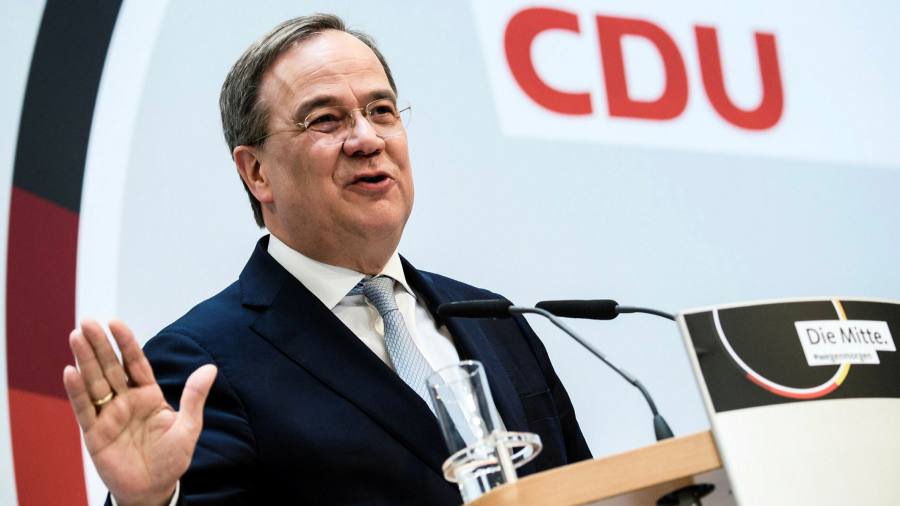[ad_1]
A heavy defeat for the Christian Democrats in two German regional elections has blown wide open the national political race six months before the country votes in parliamentary elections. The CDU slid to 24 per cent in Baden-Württemberg, eight points behind the Greens, and to 28 per cent in Rhineland-Palatinate, where it lost to the Social Democrats. It was the centre-right’s worst ever performance in regions that were once considered bastions.
It can no longer be discounted that the CDU, still Germany’s most popular party after 16 years in office, could be locked out of federal government by the end of this year when Chancellor Angela Merkel retires from office.
It would, however, be unwise to draw firm national predictions from regional polls. The two votes on Sunday were won by popular politicians with a strong local profile. They may also have been used as an opportunity by some voters to register a protest, especially when the country is still under Covid-19 restrictions with no immediate end to the pandemic in sight.
Nevertheless the elections confirm the ascendancy of the Greens, who now look assured of a place in the next coalition and can plausibly aspire to take the role of chancellor. That would have consequences beyond Germany’s borders: a second stint in power for the Greens after the red-green coalition of 1998-2005, would reshape Berlin’s attitude to public investment, fiscal discipline, climate action and relations towards Russia and China, with knock-on effects for the rest of the EU.
In Baden-Württemberg the stronger Greens now have an alternative to their existing coalition with the CDU: a tie-up with the Social Democrats and a revived Free Democratic party. This so-called traffic light coalition has won re-election in Rhineland-Palatinate. If that combination took power in Baden-Württemberg it might become more likely at federal level too.
It could encourage the Greens to fight the general election in outright opposition to the CDU, rather than as future partners. A risk for the Greens is that this prospect emboldens the party’s radical wing against its realists. But the party triumphed in Baden-Württemberg precisely because voters like and trust its business-friendly and pragmatic leader there, Winfried Kretschmann.
The option of a traffic light coalition could be healthy for German democracy. Voters have real choices. It is less good for the CDU, which plays up the threat of a radical alliance of greens, centre-left and far-left. Sunday’s elections show the CDU badly needs a fresh offer to shore up support. It has been slipping slowly away for six months, having recovered last year thanks to Germany’s impressive handling of the coronavirus first wave.
Faltering testing and vaccination programmes have badly dented the CDU’s reputation for competence. The scandal of centre-right MPs making money out of face mask procurement deals leaves it open to claims it has been corrupted by a long stint in power.
The CDU has entered a protracted electoral season without Merkel as figurehead, its trump card. There is another regional poll in June and three more on the same day as the Bundestag election. The defeats on Sunday are a terrible start for Armin Laschet, who took over as party leader this year. Laschet’s prospects of becoming the centre-right candidate for chancellor are in jeopardy.
His task now is to equip the CDU with some bold ideas for renewal. That the Christian Democrats have traditionally been a party for the status quo has been an electoral strength. After four terms in office, it is looking like a vulnerability.
[ad_2]
Source link






